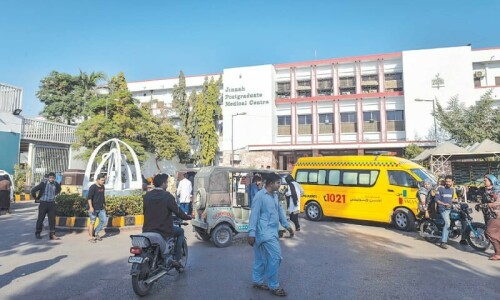KARACHI: All South Asian countries have been quite fond of signing international human rights’ treaties and conventions but leave much to be desired, when it comes to implementation.
These thoughts were articulated by former chairperson of the Human Rights Commission of Pakistan I.A. Rehman while delivering a lecture on Wednesday at a seminar on ‘Implementing Human Rights in South Asia and Europe: Policies and Practices’. The seminar was organised by the University of Karachi’s Area Study Centre for Europe in collaboration with the Hanns Seidel Foundation, Islamabad.
His presentation focused on ‘the relationship between rights and responsibilities: the role of civil society’.
Citing the example of Nepal, he said in 1990 prime minister Girija Koirala went on a signing spree and ratified major international human rights treaties. But, Mr Rehman remarked sarcastically, Pakistan had not been ambitious in a similar manner and it was only in the last five years that Pakistan had signed major treaties and covenants on human rights.
Mr Rehman then highlighted the definition of duties of citizens in different countries as enshrined in their constitutions and charter of rights. “The 1936 constitution of the Soviet Union devoted four articles to duties. The citizens had a duty to perform public duties and respect the rules of socialist discourse. Duty to safeguard property, duty to render military service and duty to defend the country.”
He added that the 1949 German constitution did not mention the word duty or responsibility. “The Indian constitution drafted in 1949 did not mention duties but in 1976 a new chapter, 4-A, was added that pertained to 10 fundamental duties. Some of which were: to renounce practices derogatory to the dignity of women, to protect the national environment, to develop scientific temper, humanism and spirit of inquiry.”
He also discussed the European Convention for the Protection of Human Rights and Fundamental Freedoms, the European Social Charter and the 1981 African Charter on Human and People’s Rights.
Interestingly, he pointed out that India was the only South Asian country that had mentioned duties of citizens in its constitution. “Other countries seem to be content with obedience to law, including Pakistan. The question whether to inscribe citizens’ duties and responsibilities in their constitutions has not been seriously debated in the region.
He said some argue that mentioning a duty in the constitution was no guarantee that it would be implemented. “To which one replies that what is the harm in writing in the constitution for instance that it is the duty of every citizen to respect everyone’s belief. When students, lawyers and other civil society members read it will raise their awareness.”
He gave the example of Norway where there was a committee that monitored the government’s human rights record domestically and internationally. And furthermore the Norwegian civil society ensures that the committee is fulfilling its responsibility.
With respect to Pakistan, he said its civil society was in a phase to ensure that Pakistan implemented all those human rights treaties that it had signed. “The main responsibility of civil society in Pakistan is to sustain a discourse on human rights. Unfortunately, we do not talk to each other anymore. We instead use weapons against each other.”
A visiting professor at the Area Study Centre for Europe, Dr Reza Kazimi, read out a well-researched and informative paper on ‘European Colonialism and Human Rights Implementation in South Asia — The issues of Sati, Child Marriage and Inoculation.’
Discussing Sati’s history, he said that it was based on the belief that a widow immolated on her husband’s funeral pyre would go to heaven. Also the burning of widows was a way to acquire their properties. “Money was even given to Brahmin pandits after carrying out the burning of widows and they would be even given her jewellery.” However Lord Bentinck, the governor general of British India (1828-1835), the main crusader in abolishing Sati, first had the feelings of the Bengal army surveyed regarding Sati and only when he was sure that they would not rise in mutiny that in 1829 an Act was passed abolishing Sati and made the practice culpable suicide. During his tenure, the governor general also abolished child sacrifice and female infanticide. “All these reforms that the British carried out were human rights reforms.”
He also gave a detailed account of the action taken against thugs (bandits and murderers who worshipped the goddess Kali and who murdered as an ideology), pindaris (muslim bandits) and measures taken against the spread of plague, where interestingly similar to the polio vaccination campaign’s thwarted efforts these days, the population back then resented the vaccine for plague.
Earlier, Usman Azhar, assistant professor at the Balochistan University of Information Technology, Engineering and Management Sciences, Quetta presented a study of children working in automobile workshops in Karachi and Dr Azra Anjum read out a paper on ‘human rights, humanity and discrimination: a South Asian perspective’ and spoke mainly on discrimination faced by females in the Pakistani society.












































Dear visitor, the comments section is undergoing an overhaul and will return soon.